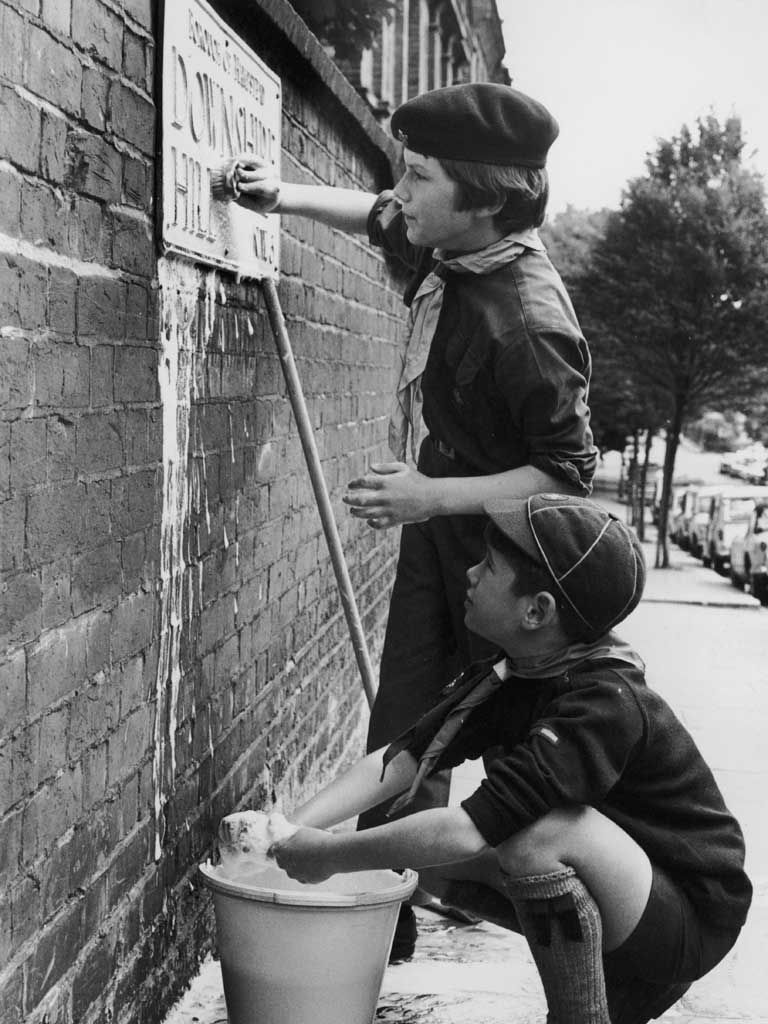Bob-a-job rebooted! Scouts go back to work
With the launch of Community Week, a very British tradition has been revived

It is two decades since scores of boys in shorts routinely went from door to door soliciting money from absolute strangers in return for manual and menial labour.
The Scout Association's "bob-a-job" scheme, an annual ritual for much of the last century, came to an end in 1992, amid fears of predatory paedophiles and harm to the health and safety of children working unsupervised.
Twenty years on, and with a new generation of youngsters, the spirit of bob-a-job is to return. Tomorrow is the start of Scout Community Week – with an army of young people being put to work in return for donations.
In a concession to safety concerns the youngsters will not wander the streets knocking on doors. Instead, they will work in supervised groups, focusing on local projects.
And unlike the old bob-a-job week – where scouts offered to do a job in return for the old shilling (5p) – there is no fixed rate.
Scout leaders are being given a target of £500 as an "achievable fundraising goal" if they plan "a week-long activity with an entire group".
Despite mutterings from critics that the scheme could be construed as exploiting boys in the name of charity or the Big Society, Justin King, the chief executive of Sainbury's, defended the scheme as "a tradition well worth resurrecting". Mr King, one of the Scout Association's "ambassadors", added: "As generations of ex-scouts know, bob-a-job builds character and connection in our communities. Through simple tasks, young people get a formative taste of the value of work, and a positive experience with people in their neighbourhood."
More than 150,000 young people will be taking part in the week, and Bear Grylls, the UK's chief scout, has pledged that their efforts will "make a huge difference to communities up and down the country".
In contrast to the car washing and garden clearing done in the past, today's tasks range from clearing woodland to help to create a bee habitat in Shanklin, the Isle of Wight, and cleaning up a swimming pool in Bude, Cornwall, to building bird tables for the garden of a care home in Eastleigh, Hampshire, and getting rid of graffiti in Bristol.
Six former scouts speak about their memories of bob-a-job
John Nichol, former RAF navigator and military author
"I remember knocking on one door and an unshaven man in a sweat-stained vest opening the door, and there's a young 11-year-old boy in uniform on his doorstep. Most people said just sweep the steps and I'll give you 10 pence, but I went in and had to clean his bloody kitchen – he had weeks and weeks of washing up piled up."
Gyles Brandreth, former MP and broadcaster
"It was not especially onerous, though I have a vague recollection of a grand lady who said 'Do you polish silver?' and then produced a vast canteen that had once been used by the Duke of Wellington. And there was an old gentleman who kept all his shoes all year just waiting for us to turn up to clean them."
David Lammy MP
"I remember a powerful sense of neighbourhood: because you were knocking on the doors of people in and around the community you met people and were encountering each other in a way that was really healthy. There were also jobs like clearing out people's front yards and cutting back overgrown gardens and stuff, which wasn't always great."
David Wickham, TV producer
"I remember once having to sweep the whole of a long, long drive and all I got was a shilling – the old guy seemed reluctant to part even with that! But equally, many's the time there was a glass of orange juice after the job, and more than a shilling. One particular old lady just kept me talking for ages... and then she gave me five bob – a fortune!"
Peter Duncan, former Blue Peter presenter and former chief scout
"The days when you could fearlessly knock on someone's door and ask if you could do a job for a shilling are long gone. When you had completed your task you provided your temporary employer with a curling yellow sticker to put in their window. There was always a scramble to find stickerless houses."
Boy George, singer and DJ
"We did bob-a-job and it involved going mostly to elderly people's houses and doing stuff like washing windows, sweeping paths or fetching a bit of shopping. I'm not sure how it would work these days. Kids seem much cheekier, and we certainly never got away with being cheeky or answering back. I remember being a scout as a time of great innocence."
Join our commenting forum
Join thought-provoking conversations, follow other Independent readers and see their replies
Comments
Bookmark popover
Removed from bookmarks